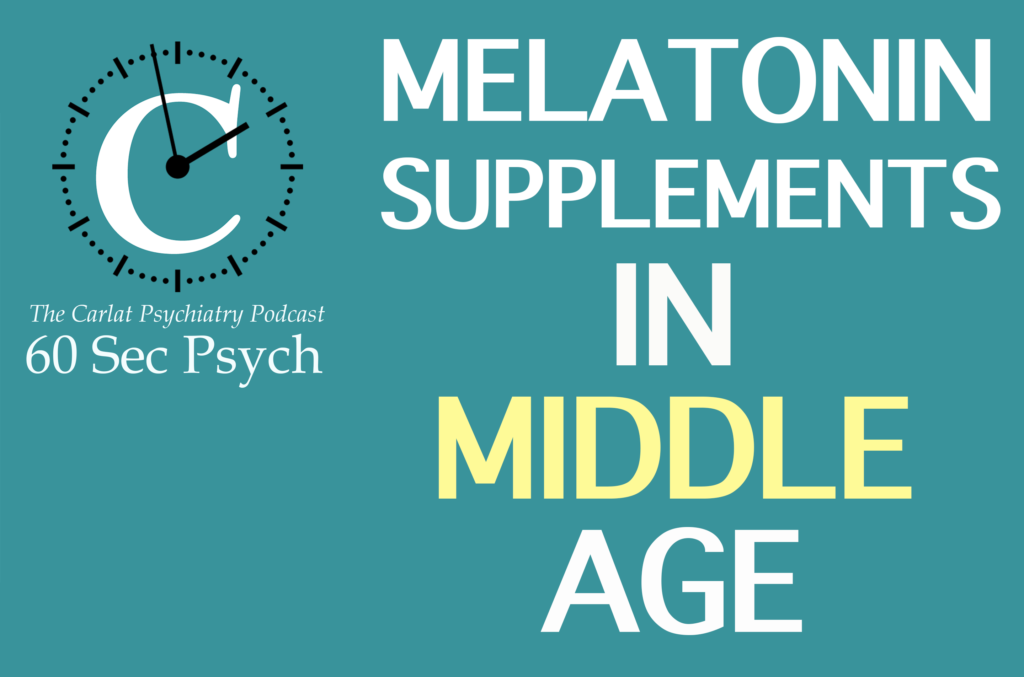Melatonin Supplements in Middle Age [60 Sec Psych]
Podcast, Volume , Number ,
https://www.thecarlatreport.com///
Most of the research on melatonin has involved older adults, and there it seems to work pretty well, just a little less effective than most prescription sleep meds. So how well does melatonin work in middle aged adults? This new study is the first to test that out. [Study Link]
Published On: 12/17/2020 Duration: 4 minutes, 5 seconds Related Article: “Is Ramelteon an Effective Hypnotic?“, The Carlat Psychiatry Report, November 2020 Transcript: Melatonin levels peak during puberty, and from there they begin a slow and steady decline. By middle age, they are half the levels of a young adult, and after age 60 their levels are almost negligible. This may be because the pineal gland which produces melatonin calcifies with age, or it may be part of the general breakdown of the biological clock that occurs with age. That’s why most of the research on melatonin has involved older adults, and there it seems to work pretty well, just a little less effective than most prescription sleep meds – check out our November 2020 article on Rozerem which has a chart comparing all the sleep meds. So how well does melatonin work in middle aged adults? This new study is the first to test that out. It was a small randomized placebo controlled trial of middle aged, 45-60, Chinese patients with insomnia from a primary care office. After excluding people with mental illness, sleep apnea, or those already on hypnotics – which 80% of the people with insomnia – there were 61 subjects left to randomize. These patients were given either 3 mg instant-release melatonin or a placebo 1 hour before bedtime for 4 weeks. Melatonin helped them stay asleep longer – by 30 minutes – and had less early morning awakening, but it did not help them fall asleep faster. None of the other metrics – including how the patients felt about their sleep and objective measures of sleep quality – changed much in the trial. Compared to placebo, melatonin had no side effects. This doesn’t mean that melatonin won’t help people fall asleep faster. It has a mild benefit in helping older adults fall asleep faster, by about 6-11 minutes, and a more significant effect in people who are extreme night owls (sleep phase delay). This makes sense because it’s a delay in melatonin secretion that causes people to be night owls. The authors speculated that they might have seen better results with melatonin sustained release 2 mg, which is the type of melatonin that’s approved as a prescription product in many countries. That dose better mimics the physiologic action of natural melatonin. All-in-all these results are encouraging, as an extra half hour of sleep is a meaningful benefit for some patients. If you use melatonin in practice, however, you may see different results. Why? For one thing, melatonin is over-the-counter in the U.S., but in countries like Canada, Australia, Japan and many European nations it’s a prescription product. Unfortunately, there’s a lot of variation in quality of over-the-counter melatonin, but we did name a few reputable products in our Nov 2020 issue in the Rozerem article. But whatever product you use, you’re likely to get much better results in practice, because even a placebo helps people fall asleep 20 minutes faster. Got feedback? Take the podcast survey.




Leave A Comment
You must be logged in to post a comment.